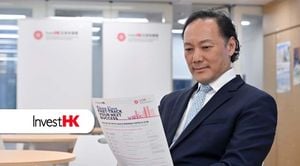The political turmoil gripping South Korea reached new heights on December 14, when the National Assembly voted to impeach President Yoon Seok-youl following his controversial declaration of martial law on December 3. This unprecedented crisis, described as one of the worst political upheavals the country has faced in decades, has left many speculating about the future stability of South Korean governance.
Prime Minister Han Duck-soo, designated as interim leader under constitutional provisions, will oversee the country for up to eight months as the Constitutional Court deliberates on the validity of the assembly's impeachment decision. Han, 75, has pledged to dedicate his full strength to stabilize the nation during this tumultuous period. "I will devote all my efforts to ensuring the country moves forward with stability," Han stated during his first address as acting president.
The impeachment follows troubling allegations against President Yoon, primarily surrounding his unconstitutional imposition of martial law, which legal experts, including Kim Hyun-joong from Korea University, deem to have clearly violated fundamental laws. Such drastic measures were seen as attempts to paralyze the government, triggering widespread concern about the potential ramifications for democratic integrity.
The process of impeachment, which has precedent from the prior case of former President Park Geun-hye, is marked by its lengthy nature. When Park was removed, it took the Constitutional Court three months to reach its decision. Currently, three judicial positions remain vacant, complicate how quickly the court can adjudicate Yoon's case. Legal experts assert the requirement for unanimous support from at least six of the nine Supreme Court justices to sustain the impeachment motion, placing additional pressure on existing justices who must navigate these sensitive evaluations.
On the streets of Seoul, protests both supporting and opposing Yoon's leadership have surged. Hundreds of citizens have convened at Gwanghwamun Square, expressing their desires for either continued support of Yoon or calls for his resignation. Political analyst Baek Kang-hun argues the demonstrations will persist until the Constitutional Court reaches its conclusion—expressing solidarity among factions advocating for regime change as they voice discontent.
Competing for the presidency appear figures like Lee Jae-myung, head of the main opposition Democratic Party, who has emerged as the frontrunner to succeed Yoon. Observers note Lee's strong leadership capabilities throughout the crisis, having played pivotal roles as events unfolded. Despite facing his controversies—including allegations of campaign violations—polls indicate more than half of voters favor Lee's candidacy for the upcoming election, should it occur.
Meanwhile, the Ministry of Finance remains committed to stabilizing the national economy amid the charged political climate. Following Yoon's impeachment, the ministry has assured it will cooperate closely with lawmakers to implement policies geared toward economic resilience. "We will engage with the National Assembly closely to maintain economic stability," promised officials, setting forth immediate economic plans. The Bank of Korea also reassured collaboration with the government to leverage various policy tools to avert severe volatility within financial markets.
Given these developments, Japan has remained vigilant, planning to maintain communication with South Korean officials as the situation evolves. Following Yoon's impeachment, Japanese officials expressed concerns over potential diplomatic ramifications between the countries, particularly considering the timely upcoming anniversary of their bilateral relations. Japan's Defense Minister Nakata Gen emphasized the need for cooperative efforts to tackle international challenges, acknowledging South Korea's pivotal role as a neighbor.
The outcome of these rapidly changing circumstances remains unclear, but it is evident South Korea is at a crossroads. What remains to be seen is whether the political unrest will lead to significant reforms, and the extent to which the electorate will shape the future governance of the nation. Factors such as the Constitutional Court’s decision and public sentiment may very well dictate the narrative moving forward, inevitably impacting not just domestic politics but regional alliances and economic stability.



